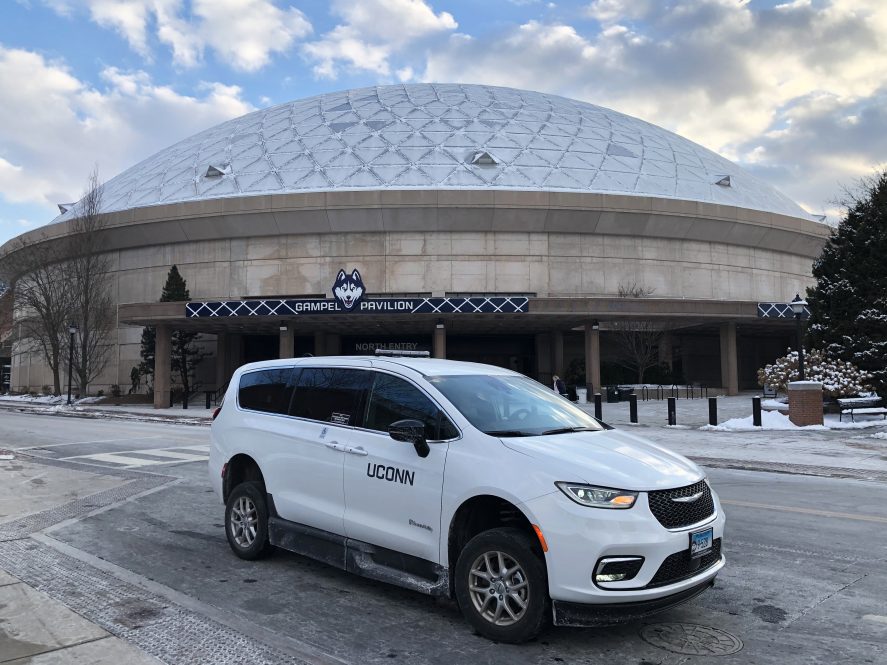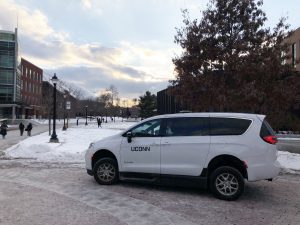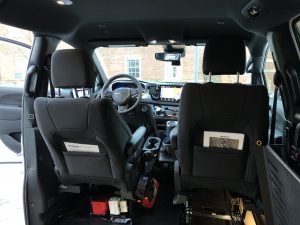'AVS allows people to live where they want on campus and still maintain the same level of presence as any other student'

The UConn Accessible Van Service (AVS) provides free transportation to students with disabilities or injuries (George Velky / UConn Photo)
The UConn Accessible Van Service (AVS) is a student-run program within Facilities Operations that has provided free rides around campus for disabled and injured members of the UConn community for over a decade.
White minivans with "HuskyGo" labels printed on the trunks, shuttle students and faculty all day long.
"The breadth of folks who use the service range from people who are wheelchair bound permanently to students who twisted their ankle and need help getting around for a week," says Andy Kelly, associate director of logistics at UConn.
"The service is important because it kind of sets the standard for equity," says Ryan Dang '25 (ENG), student manager and AVS coordinator. "Everybody should be given the same opportunity to go to classes, run their errands and do what they need to do, despite whatever disability that they have."

This semester, there are roughly 400 students and staff who rely on the service. The vans serve the entirety of the UConn Storrs campus and up to one mile off campus. There are 231 pickup and drop-off points, says Dang. An interactive map with all pickup locations is provided via QR code to the passengers so they can pinpoint exactly where the best spot is for their next ride.
"It provides a significant peace of mind for the folks who use the service, so they don't have to worry about being able to be full participants in the college experience," says Kelly.
There are about 40 employees with the service, the majority of who are students. The program is completely facilitated through student managers Ryan Dang and Nicole Corkery '25 (CLAS). Eight full-time employees staffed by WRTD also keep the ship running.
Student drivers enjoy connecting with their peers on campus.
"Making sure you greet passengers when they get in the van is big," says Shealyn Docker '25 (CLAS), AVS driver. "Just so that they feel comfortable and that they're welcomed."
Docker has been working for AVS for three school years and loves the job. She explained how she has built relationships with many of the passengers, and she looks forward to driving them every day. Docker mentioned one passenger she would drive to and from work. "He always talked to me about his granddaughter and his children, how work is going, and how he's super grateful that I drive him. I miss him."
For many of the passengers, AVS is the primary means of transportation. The service runs from 7 a.m. to 10 p.m. on weekdays, 11 a.m. to 8 p.m. on Saturdays and 11 a.m. to 7 p.m. on Sundays. Drivers understand the importance of their work and are often eager to pick up shifts to make sure each passenger's accommodation is met.
Students can find eligibility for the service by connecting with the Center for Students with Disabilities. University staff can contact HR to see if they meet the needs for accommodation.

There are five vans with wheelchair ramps, and the rest do not have wheelchair accessibility. One goal Kelly has for AVS is to upgrade the entire fleet to have ramps. When each van has a ramp, it will put the service in a place to better provide the right level of service for the right people, says Kelly.
Other qualities that ensure safety and accessibility include strobe lights on vans for visually impaired passengers and backup cameras. Drivers are required to always wear a high-visibility vest and drive with headlights on at all times of day. They are also trained to know the campus like the back of their hand, so they can make the experience for the passengers as seamless as possible.
"AVS allows people to live where they want on campus and still maintain the same level of presence as any other student," says Dang. "It makes them feel like any other person on campus. It doesn't make them feel like an outsider."






